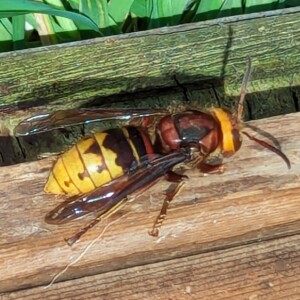Incoming
I'm standing in almost exactly the same place as yesterday's picture. This is a guard-bee's eye view of returning foragers, on what turned out to be a warm but windy day, so not all these fliers are in total control of their descent; there were a few crash landings
Each individual bee works its way through a series of tasks as it goes through its life, partly driven by physiological and morphological changes as it gets older (sound familiar?). Young bees clean out cells after larvae have emerged, or make wax, or feed the queen or feed larvae, or potentially all of these at some point. Older bees may become undertakers - carrying dead bees from the hive floor away from the hive; most will become foragers, ending their life on the wing for the good of the colony
And some take a turn as guard bees, stationed at the entrance to prohibit entry to unwelcome visitors, such as wasps, or bees from other colonies, and to alert the colony to bigger dangers such as bears, honey badgers or beekeepers*. In these circumstances, they release alarm pheremones that enlist help from other fully mature bees (with fully mature stingers!), who in turn release more pheremone, precipitaing a cascade of defensive behaviour and possibly an assault against the threat. Some people can detect the ripe-banana smell of alarm pheremone, though I never have
One purpose of the beekeeper's smoker is to drift smoke across the hive entrance before opening it, deterring any reconnaissance from the guard bees, and inhibiting the effect of any alarm pheremone, so that the avalanche of uproar never gathers momentum. It is as simple as it sounds, and it works
The extra is a visitor who stopped by while we were engaged in inspections. This gentle giant (3cm long) is a European hornet, almost certainly a queen, sitting on the edge of the upturned hive roof. Unlike their (slightly smaller) invasive Asian cousins that are now causing such disquiet, they pose very little threat to honeybees (or people). The bees seemed to know as much, and ignored her
The bees are fine, by the way. No swarming yet; plenty of developing brood; adequate food stores; excited by finally having a day when they can visit the oilseed rape fields. Like bees that have been smoked, we can relax a little
* Not all of these are found in our village


Comments
Sign in or get an account to comment.


